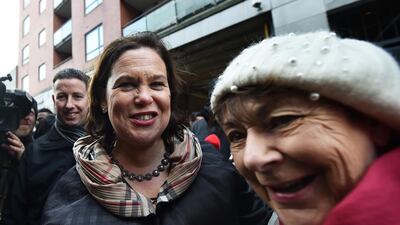Jockeying for the right to form the next Irish government was in full swing Monday as nationalist party Sinn Fein secured the most votes in an election that has been described as “something of a revolution in the ballot box” by the party’s leader Mary Lou McDonald.
Sinn Fein, the political wing of the IRA, have taken 24.5 per cent of the first preference votes, ahead of centre-right parties Fianna Fáil on 22 per cent and Fine Gael on 21 per cent. While the party also had most declared seats in the 160 member parliament, ongoing counting could see one of its rivals emerge on top when the process is complete.
The result is a 10 per centage improvement from Sinn Fein’s showing in 2016 boosted by the party’s proposals to tackle social inequality rather than its central pledge to unite the country with Northern Ireland.
On Monday afternoon, almost two-thirds of the seats in the parliament had been filled, with Sinn Fein had taken 36, Fianna Fail 21 and Fine Gael, the party of the incumbent prime minister Leo Varadkar, 19.
No party will reach the 80 seats needed for a majority so a coalition government is expected to be formed.
Both Fianna Fail and Fine Gael, who have governed Ireland since it won independence from the UK a century ago, ruled out forming a coalition with Sinn Fein before the election because of its links to terror.
Mr Varadkar said his party’s position was unchanged after the result.
But Fianna Fail leader Micheal Martin did not repeat his party’s stance, although added that were “significant incompatibilities on policy”.
“I’m a democrat,” he told RTE. “I listen to the people. I respect the decision of the people.”
Sinn Fein’s leader Ms McDonald said she was exploring options to share a government with independents and smaller parties such as Labour and the Social Democrats.
The party is calling for a vote on Irish reunification within five years.
A spokesman for British Prime Minister Boris Johnson said the UK was “following the results of the Irish election carefully”.
“The close relationship between the UK and Ireland will continue regardless of the election result,” he said.


